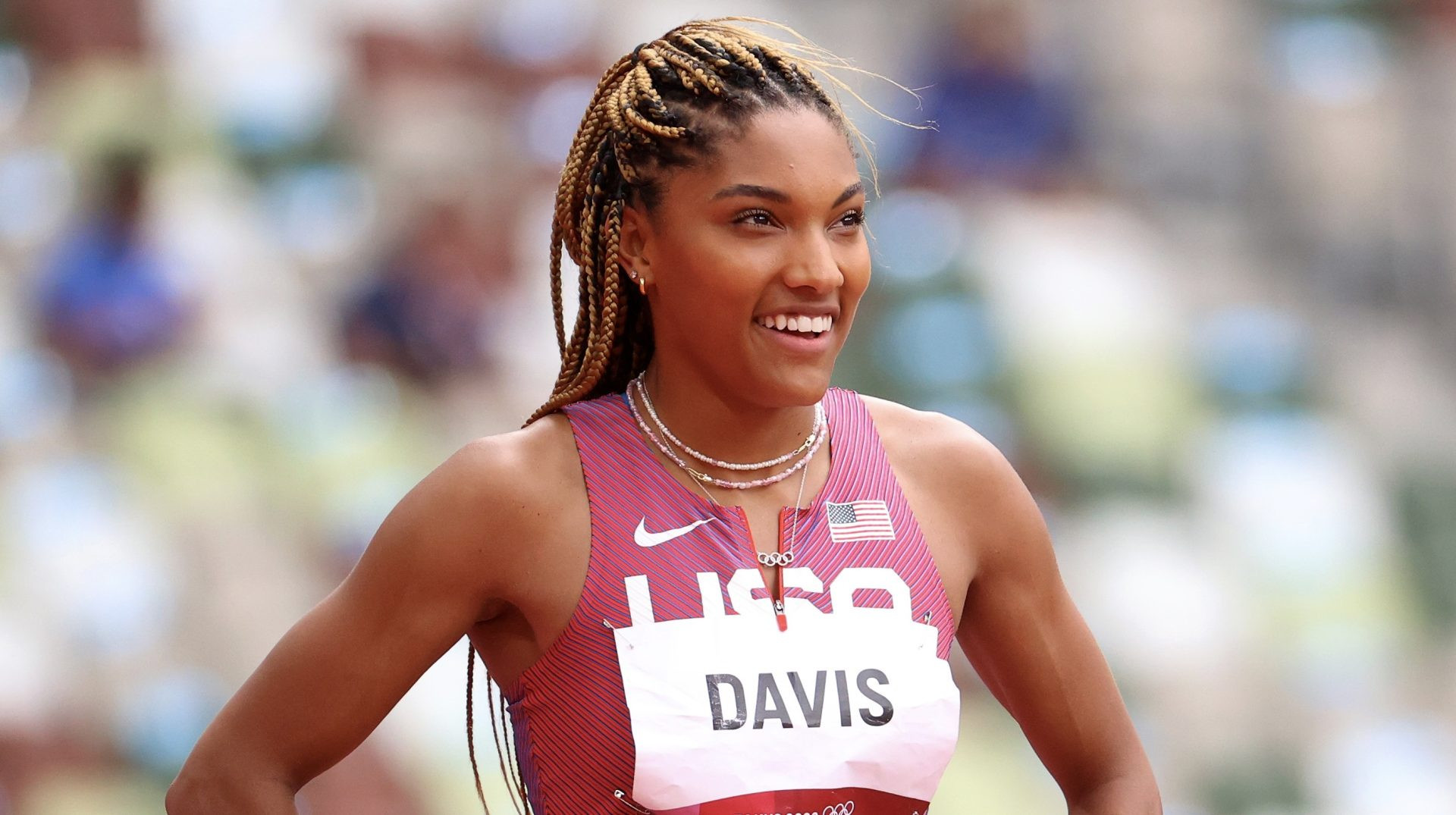After taking the Olympic long jump lead following her second attempt on Thursday at Stade de France, Tara Davis-Woodhall's next focus was on making sure there was no doubt.
While reigning Olympic champion Malaika Mihambo put together a challenge over her fifth jump, it wasn't enough to topple the California native, as Davis-Woodhall scored a winning mark of 7.10 meters on her fourth attempt to seal her first Olympic title.
With a silver medal from the 2023 World Championships in Budapest behind her, Davis-Woodhall continued her emergence on a global scale.
Mihambo from Germany, the 2021 winner and a two-time World champion, was second with a mark of 6.96 meters while Jasmine Moore, who had earned bronze in the triple jump on Aug. 3, followed with her second straight medal and a third-place finish with a mark of 6.96m.
Moore became just the second woman in Olympic history to medal in two events, joining Russia's Tatyana Lebedeva, who secured medals in both events in 2004.
Moore led the group with a mark of 6.96m after the first jump of her series.
Headed into her final three attempts, Davis-Woodhall led with Moore in second and Mihambo in third. She padded her broad sheet with a 7.10 meter effort on her fourth attempt.
The reigning Olympic champion had distance to make up and with her fifth attempt she did. Mihambo hit 6.98m in the pit to move up to silver, moving Moore to third.
A Texas Tale of Two Jumpers
SAINT-DENIS, France ― Her gold medal assured and tears in her eyes, Tara Davis-Woodhall went through the motions on her last long jump Thursday to see if there was any history in her. Her duty done, she stood up, opened her arms and let the love of Stade de France roll down on her until she fell backward into the pit, a load lifted at last.
Nothing could upstage the moment she’d envisioned since she was a kid growing up in Frisco.
Nothing except maybe the woman she’s known since they were girls on Texas’ track circuit.
Jasmine Moore followed up her bronze medal in the triple jump last week with another in the long jump, becoming the first American woman to do so and only the second female in Olympic history.
“You’re incredible!” Davis-Woodhall said, turning to Moore at the medalists’ news conference.
“History-making!”
The pair’s “Texas-raised” history, Davis-Woodhall added, puts a Lone Star spin on the tale of the two women bracketing the long jump medal stand Thursday. A couple of small-town Texas girls coming up big on the world’s grandest stage.
Which is where any and all similarities between the gold and bronze winners end.
“Polar opposite,” Moore said.
“Yeah,” Davis-Woodhall said. “Definitely.”
Different Paths, Shared Triumph
A short video of Davis-Woodhall at the track Thursday: Here she is minutes before the competition starts, planting a kiss on her husband, Paralympian Hunter Woodhall; now yelling encouragement at the U.S.’ Nikki Hiltz as she races past in the 1,500 meters; preening in front of the camera; blowing kisses at the crowd; clapping to get the audience revved up; bobbing and barking and basically doing everything possible to draw attention to her and her favorite event.
Moore would have been just fine if everyone had gotten up for the concession stand.
Another short video, this time from the Olympic Trials, where Moore is on the medal stand after winning the triple jump:
Her parents, Earl and Trinette, are beside themselves in Eugene, Ore. They have waited for this moment since making her practice with a track coach on her 11th birthday, an incident famous in the Moore household because Jasmine called her grandmother to report the child abuse. That their faith in their youngest daughter’s potential has been rewarded makes them practically apoplectic. A bit too much, apparently, for Jasmine’s liking.
“She’s up there pulling her finger across her throat,” Trinette said, “telling us to cut it out.”
Davis-Woodhall’s path to the podium Thursday was as different from Moore’s as their personalities. Moore grew up in Grand Prairie and starred at Mansfield Lake Ridge before competing first at Georgia and then Florida. Davis-Woodhall left Frisco for high school in California, then Georgia and finally the University of Texas for a life-changing moment in the fall of 2020.
Despondent at being unable to compete because of transfer rules and a fractured vertebrae, she sunk into such depression that she didn’t leave her room for a week.
“I did not want to be here,” she said Thursday. “I couldn’t see myself being an Olympic champion.
“Up until the day I stepped out of that bed and I was like, ‘I’m gonna do this.’”
First thing she did was set the collegiate record in the long jump at the Texas Relays, then qualified for the 2020 Olympics, finishing sixth. Looking back, she realizes she was a college kid on a lark in Tokyo. She’s better focused now. Even credits a new dietary regimen heavy on red meat for improving her conditioning.
On her first jump Thursday, she posted 6.93, setting the tone. Then Moore did her one better at 6.96.
Turning to look for her score, Moore raised both hands to her face, then overhead before just as quickly lowering them again, her equivalent of a cartwheel.
The rest of the time she looks like someone waiting to be audited. A picture of self-doubt. She’d previously admitted during the Games that, only a couple of weeks ago, she wanted to drop the triple jump and concentrate on the long jump. Her coach, Nic Petersen, talked her out of it, as did her parents, who had to remind her that she earned the right to compete in both.
Making history will only feed her confidence, Jasmine said, because she accomplished something “way better than I could have imagined.”
Her mother, an All-American long jumper at Florida State, feels some vindication in that.
“It was something she had to prove to herself,” she said. “We could see the talent. We’d tell her, ‘You look good. You look great.’ But she wasn’t getting the results in college, and that hurt her confidence.
“We told her she always finds a way.”
Finding Harmony in the Competition
Of all things Thursday, Davis-Woodhall helped Moore find a little peace. Over the course of their event, they talked, watched other athletes compete, pretty much just enjoyed themselves.
“I think Tara kind of makes me relax a little bit,” Moore said. “Our personalities are polar opposite, so it’s nice having someone that’s kinda more upbeat to be around me because it just helps me chill out.”
Through four of the six jumps, it looked like Davis-Woodhall, whose 7.10 was just .01 off the 10th best in Olympic history, and Moore might finish 1-2. Then Germany’s Milaika Mihambo leaped 6.98, nudging Moore to third. When Mihambo fouled on her sixth attempt, the party was on.
Davis-Woodhall leaped into her husband’s arms, kissed him, then pulled back and screamed, “I did it!” One of Moore’s peeps planted a cowboy hat on the champ’s head, a nod to her usual headgear at meets, curiously missing until Thursday.
Maybe she was saving it for the celebration.
“Hey, y’all, is this real?” she asked the media waiting for her in the mixed zone. “Am I dreaming? Pinch me. I’ve been dreaming of this moment for so long. Ever since I was 4 years old. I have been through hell and back. I have, like, faced everything that you can imagine.
“And I told myself, ‘Not today.’”
No, not Thursday, when a couple of women with Texas roots both made the podium. When they heard that Simone Biles and Snoop Dogg had seen it, they giggled like a couple of girls at a sleepover. They’ve come a long ways since those days.
A Moment of Triumph, a Legacy of Inspiration
Tara Davis-Woodhall, a bubbly, cowboy hat-wearing American long-jumper, won a joyous gold medal here at the 2024 Olympics on a jam-packed Thursday night of track and field.
She jumped 7.10 meters, blowing away a reigning Olympic champ and the rest of the field to claim her first Olympic title — and first Olympic medal of any kind.
Germany’s Malaika Mihambo, the defending gold medalist and a two-time world champ, took silver with a best jump of 6.98. Team USA’s Jasmine Moore took bronze at 6.96, and became the first woman in a while to win medals in long jump and triple jump (also bronze) at the same Games.
The star of the event, though, was Davis-Woodhall, a social media sensation who energized the crowd from the moment she strutted out of a tunnel here at Stade de France and onto the track.
Six jumps later, she stretched her arms wide, and fell back into the long-jump pit, overwhelmed by emotion. She did a few sand angels. Then she found her husband, Paralympian Hunter Woodhall, in the stands and leapt up into his arms.
Davis-Woodhall, now 25, made her Olympic debut in Tokyo. She finished sixth, which nowadays would be a letdown; but at the time, it was a launching pad.
“I did not expect to be in Tokyo,” she recently recalled. “I was a college kid out there just jumping for fun.”
She realized, over subsequent years, that she could be something more. She won her first senior national title at indoor championships in 2023 (though she was later stripped of the title after testing positive for cannabis). She took silver at world championships that summer.
She entered 2024 as a medal favorite. But her runway to Paris was anything but smooth. She said she took three weeks off from jumping to nurse “a really gnarly bone bruise in my heel.” She qualified first at U.S. trials with a jump of 7 meters flat, but only after a scare; the heel hadn’t healed.
“I’m still dealing with it,” Davis-Woodhall said here in France. “But we live and we learn, and we’re just gonna go out here and do what we can do.”
She opened here Thursday night with a 6.93. After one jump apiece, Moore, her fellow American, was a few centimeters better. But in the second round, Davis-Woodhall exploded past the 7-meter mark to 7.05, and established herself as a clear leader in the clubhouse.
Mihambo got to 6.95 in Round 3, 0.01 behind Moore and a full tenth behind Davis-Woodhall. But she overstepped the foul line in Round 4. Davis-Woodhall, jumping immediately afterward, bettered herself with a 7.10 and extended her lead, which she held through all six rounds to claim gold.

















